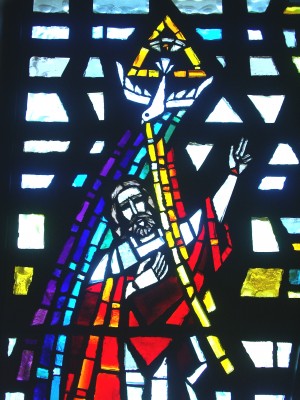A miraculous thing happened when Pope Francis called the Church, Christians everywhere, and all people of good will to intercede in fasting and prayer for peace in Syria. Within days, one diplomat’s casual comment was taken seriously by another, and the door to peacemaking cracked open, allowing in the light of unexpected hope. What was behind that “power of prayer”?
The sacramental reality of Baptism, affirmed yet more deeply in Confirmation, is this: we are anointed into the priestly, kingly, and prophetic mission of Jesus himself. We are not anointed merely to be like Jesus, but to stand in his place, here and now, to intercede for the world.
In short, Jesus entrusts to us a full share in his own redemptive work. He actually trusts us. If he has such confidence in our sacramental anointing, we should, too.
Our prophetic role, essentially, is to read the signs of the times through the lens of the Gospel. Free of the undertow of political spin on issues of grave social concern, we can form ourselves deeply in the mind, heart, teaching, and life of Christ himself as we notice what really is going on in our world.
The kingly role, essentially, is to bring right governance, justice, mercy, and a noble generosity to the world we touch. In this role of wise stewardship we discover the dignity and obligation bestowed on us as anointed sons and daughters of the Most High.
But it’s this priestly role that most captures my attention. Distinct from the role of those men who are called and anointed in a special way in the sacrament of Holy Orders, the priestly role of all those baptized into Christ is one of powerful intercession.
Even from early biblical times (recall Moses), the priest was the one who stood in the gap and interceded mightily on behalf of the people for God’s mercy, favor, and protection from real harm. The priest was anointed to stand in the breach where anguish dwells, and in prayer and supplication to “weep, / And say, ‘Spare, O Lord, your people, / and make not your heritage a reproach’” (Joel 2:17). Earlier in the Book of Joel we find a description of this priestly work of intercession: “Gird yourselves and weep, O priests! / wail, O ministers of the altar! / … Gather the elders, / … [i]nto the house of the Lord, your God, / and cry to the Lord!” (1:13-14).
Most of us are quick to pray for people in trouble or distress, whether they ask us personally, whether someone alerts us to the need, or whether we watch unimaginable suffering on the evening news. But a deeper work of our baptismal anointing is to actually stand in the gap where anguish dwells, to go into the trenches and advocate for those who have no voice, no way to stand against the Goliath forces of injustice, no way to win a hearing, and to plead their case with power, dignity, and effectiveness.
Today baptized men and women are being called upon to come forward courageously and to stand in those gaps where anguish dwells, to speak the truth to powerful forces who can pay to not hear it. By virtue of our priestly baptismal anointing we are called upon to intercede right here at home, in our region or state, or on the world stage, according to the ways we have been gifted.
Which means: Our priestly intercession, along with our prophetic understanding and our kingly governance and right stewardship, forms the very core of our vocation. If you wonder: “How is God calling me?” the reality is this: We already are sacramentally anointed to be the mercy and justice of the risen Lord himself. The next step is to physically, intentionally, and wholeheartedly insert ourselves into the needful places, and be courageous advocates guided in each breath by the Holy Spirit.
Copyright 2013 Mary Sharon Moore, M.T.S.
About the Author

Guest
We welcome guest contributors who graciously volunteer their writing for our readers. Please support our guest writers by visiting their sites, purchasing their work, and leaving comments to thank them for sharing their gifts here on CatholicMom.com. To inquire about serving as a guest contributor, contact editor@CatholicMom.com.



.png?width=1806&height=731&name=CatholicMom_hcfm_logo1_pos_871c_2728c%20(002).png)
Comments